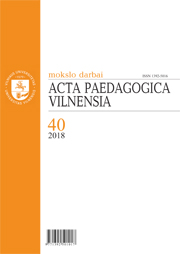Neformaliojo ugdymo ribos: poststruktūralizmo perspektyva
The boundaries of non-formal education: The post-structuralist perspective
Author(s): Justina Garbauskaitė-JakimovskaSubject(s): Education, Structuralism and Post-Structuralism
Published by: Vilniaus Universiteto Leidykla
Keywords: non-formal education; post-structuralism; educational change; map; rhizome;
Summary/Abstract: In the year 2009, Israeli scientists Shlomo Romi and Marjan Schmida wrote that non-formal education “still suffers from an overemphasis on practice, and lacks a comprehensive, adequate theoretical framework” (Romi, Schmida 2009). The aim of this article is to address the insufficient grounding of non-formal education and to propose a post-structural perspective on it. The article is based on the analysis of literature. The scientific articles, documents and information provided by national and international organizations are interpreted in the frame of post-structural philosophy by using the concepts introduced by Michel Foucault, Gilles Deleuze and Fèlix Guattari. The phenomenon of non-formal education is analyzed as a single concept, without the distinction of nonformal education for children, youth or adults. The stand is that the main principles of non-formal education are universal and transferrable. Therefore, the object of the study is non-formal education, while its aim is to interpret the development of non-formal education in the context of post-structuralism.
Journal: Acta Paedagogica Vilnensia
- Issue Year: 2018
- Issue No: 40
- Page Range: 142-154
- Page Count: 13
- Language: Lithuanian

